by Grant Bridgman
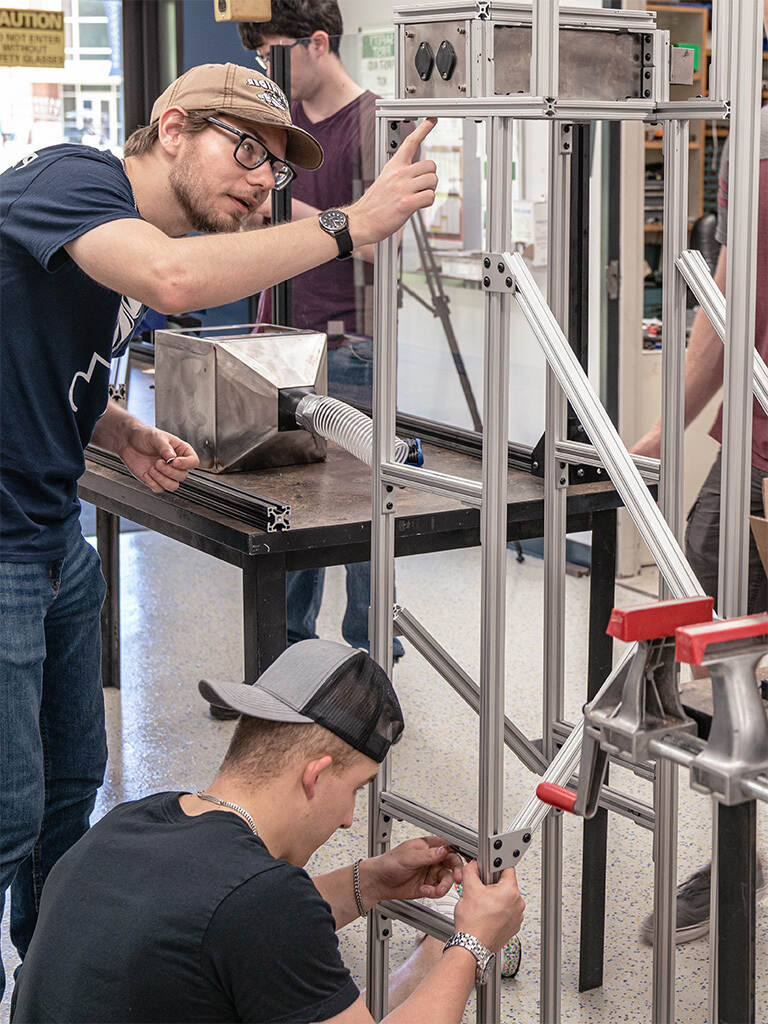 From the whirring of lathes to the whooshing of the wind tunnel; from the clatter of wheelchair testing to the gurgle of water runoff systems. Sparks from grinders, saws, and tig welders juxtapose with the silently powerful software of motion analysis systems, scanning electron microscopes, 3D modeling applications, or artificial intelligence. You may not always find pristine polish amid the practically-presented posture of our student designs, but the fusion of hard-hitting, intellectual problem solving with hands-on industry preparation is palpable.
From the whirring of lathes to the whooshing of the wind tunnel; from the clatter of wheelchair testing to the gurgle of water runoff systems. Sparks from grinders, saws, and tig welders juxtapose with the silently powerful software of motion analysis systems, scanning electron microscopes, 3D modeling applications, or artificial intelligence. You may not always find pristine polish amid the practically-presented posture of our student designs, but the fusion of hard-hitting, intellectual problem solving with hands-on industry preparation is palpable.
The LeTourneau University Senior Design project gives LeTourneau engineering students a capstone opportunity to gain real world engineering experience as they ask big questions of themselves and the innovations they seek to produce. Beyond the theory, students dive in and actually work out the answers to these questions with their own hands, heads, and hearts.
A Heritage of Preparation
Visualize a hammer. Can you see it? Of course you can. A hammer is a fantastic and timeless tool—that unfortunately doesn’t help you much if you need to drill in a screw. A wheelchair is a wonderfully effective means of transportation for those with physical impairments—until they need to move across more uneven surfaces or live in areas with limited pavement. Arc welding is a tried and true method of securely joining similar metals that society benefits from every day—but what if the weld must happen while submerged underwater?
These situations, questions, and many others like them are common in the world of engineering, both past, present, and certainly in the future as well. Engineers apply science and mathematics to solve complex problems. Practically speaking, an engineer seeks to figure out how something works, observe the problems, and make systems work better, or create a new way of solving the problem. Creating order. A tall order at times; yet our world today needs much more than practical innovation.
Understanding the purpose and need for engineers in our broken world is not lost on most people you encounter. There will never be a shortage of problems that need solving. A more common debate in the world of learning is the question of what provides the “best”, or at least most-effective, venue for engineering education. Some would argue on behalf of the school of “hard knocks” or learning from trail and error; from failure and disappointment. The more traditional approach to industry preparation is seen in the form of a four-year degree from an accredited college or university engineering program.
In terms of higher education, there are 363 institutions in America that offer some form of engineering degree program. If you look at faith-based universities, the list narrows to 13 schools nationally. If you look for a faith-based university founded by an actual engineering industry innovator, you are left with one option: LeTourneau University, in Longview, Texas. This heritage of innovation and industry preparedness is seen all over campus, but a special tradition of excellence resides in the classrooms and elite lab experiences of the engineering programs.
John Tixier, Assistant Professor for Mechanical Engineering Technology and Senior Design Program Coordinator, defines the structure and purpose of engineering senior design at LeTourneau: “Our program is a two-semester, teamwork based, multi-disciplinary, design-build-test type of project.” Students work on the same project, with the same team, with engineers from various disciplines. They have to create a design, actually build it, and put it to the test.
“The dirty little secret”, John says, “is that it usually doesn’t work. There is failure and disappointment involved.”
Failure and disappointment? Wait a minute, are we talking about a private university or the “school of hard knocks”?
You heard right. Senior design makes up only two of the eight semesters of hands-on work for LETU engineering students. As Joe Ryan (’22, team lead for LUNAR: LeTourneau University Nexus for Amateur Rocketry) comments, “From our first semester as freshmen, all the way through, there are so many projects to experience. We have so many labs at our disposal, and we have access to those labs so freely. There are also such great faculty/student relationships, which really have given me a more personal experience to my education.”
Like many other engineers, Joe’s comment highlights how, in college, relational benefits may come second only to the practical benefit of more lab time for accomplishing work.
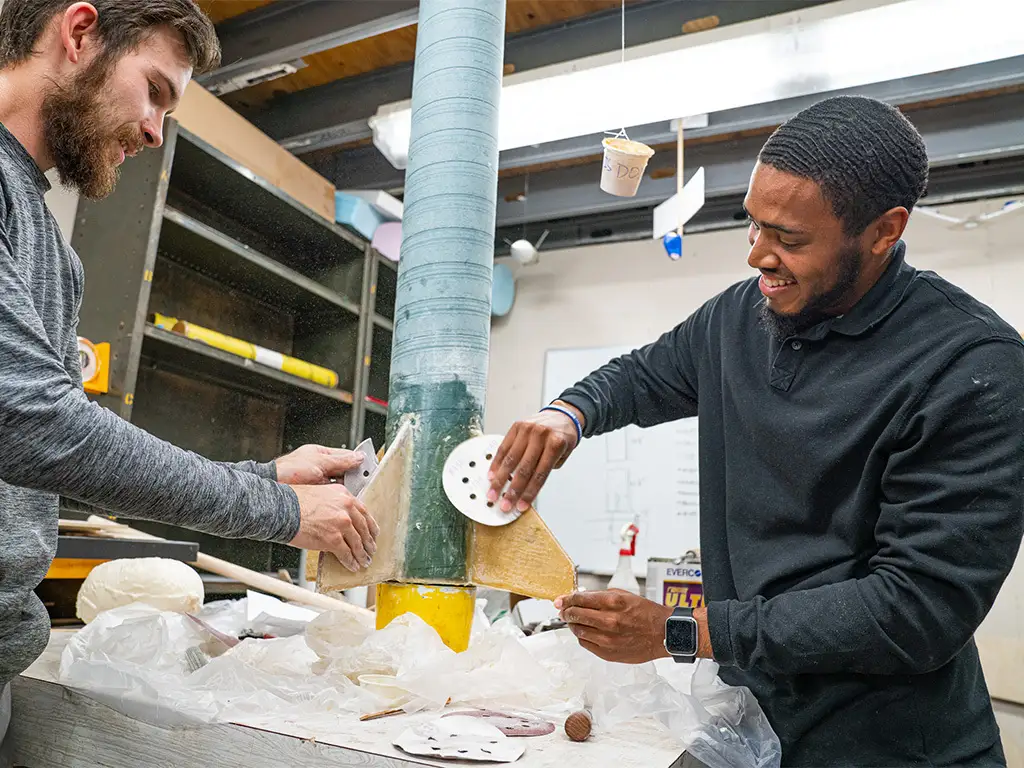
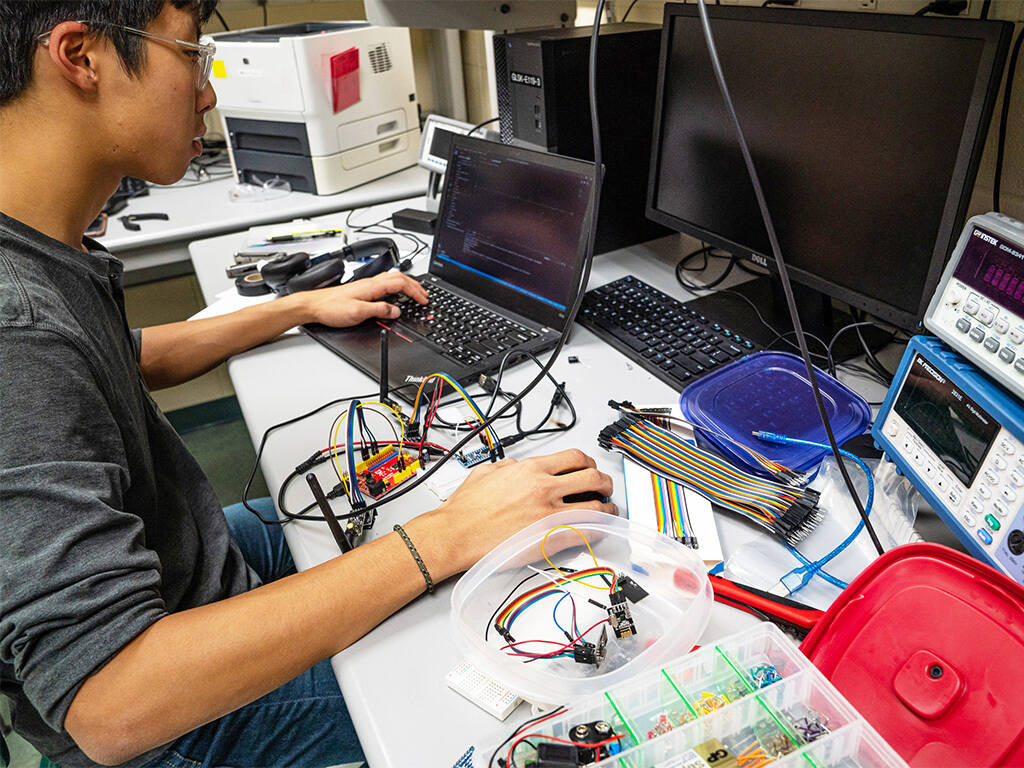
A Posture of Possibility
During the 2021-2022 academic year, there were 13 different senior design projects. Some projects are made for competitions, such the LUNAR rocket, some are designed with ministry in mind, such as a wheelchair for a community in Central America with poor civil infrastructure. Some focus on cutting edge technological processes such as the TANDEM team’s work to increase productivity, flexibility, and repeatability of submerged underwater arc welding. Still others focus on working with a real-world client to produce a solution to a problem.
BADGER was one such ‘real-world’ project, where students worked to create an autonomous mobile robotic device to specifically target and chase geese away from golf courses. Caleb Nilsson (’22 BADGER team lead) speaks to the hands-on nature of the work.
“I know a lot of schools where engineering senior design work consists of coming up with a theoretical problem, then creating the solution on paper. They never build it or test it. Here, on our projects, you have to actually get your hands dirty.”
The actual work was just the tip of the iceberg for what made senior design impactful for Caleb. “I have learned about managing people, about working with an interdisciplinary team, and about engineering principles that are amazing—like entropy, a measure of chaos or uncertainty.”
Speaking of uncertainty, on the other side of the topic of design innovation are the questions revolving around ethical usage of technology. As much as we long for solutions to the problems in our world, an end to the suffering around us, and a general flourishing for our families and societies, a deeper quandary often arises, once practical—and even groundbreaking—innovations are introduced.
In December of 1938, Swedish physicist Lise Meitner and her nephew, physicist Otto Frisch, discovered how to make possible what was previously thought impossible—splitting a uranium nucleus in two. This discovery was, of course, used in the work of creating the first atomic bomb, a work which Meitner wanted no part of whatsoever.
We live in a world filled with many more technological ‘impossibilities’ than that of 1938. How can the engineers of tomorrow prepare for ethical dilemmas to multiply? How can future innovators stand in the gap and have the boldness to ask big questions for the benefit of the world around them? LeTourneau senior design students are pursuing a training which leans into a conversation shift, from ‘just because we can build it’, to ‘should we’? These students wrestle with the ‘purpose’ and/or ‘penalty’ of an innovation before simply approving the ‘practical’ benefits.
Dean of LETU School of Engineering and Engineering Technology, Dr. Steve Starrett, one of the leading voices in engineering ethics, states: “Engineering is a vital profession for humanity. The technically challenging situations that current and future generations face are immense. In creating engineering solutions, it is critically important that engineers maintain high ethical standards, as we are trusted by the public. Our engineering ethics skills are just as important to society as our technical skills.”
Equipping Christian engineers to develop their ‘soft skills’ to be equally as formidable as their technical skills has become a hallmark of the engineering experience at LeTourneau University.
Our students are thrust into these ethical conversations while they continue to hone their technical expertise. The connection between their purpose and their practical training is what most students would cite as the immensely meaningful linchpin of their education.
Erin Trantham (’22, LeTRep2 team) speaks to this connection as it relates to the work she did on senior design this year: “I have been on this project for two years, and the reason I stuck with it and am so passionate about it is because this project actually helps people, and that fits right into what Christian engineers should be focusing on—using our engineering for the good of the world.”
A fascinating and perhaps insightful commentary on the real purpose behind years of hard work. This drive that our students feel does not simply come from a desire to be a ’really good engineer’. The cornerstone of these design projects is where technical skills meet development of character. This fulcrum of learning permeates their professional pursuits.
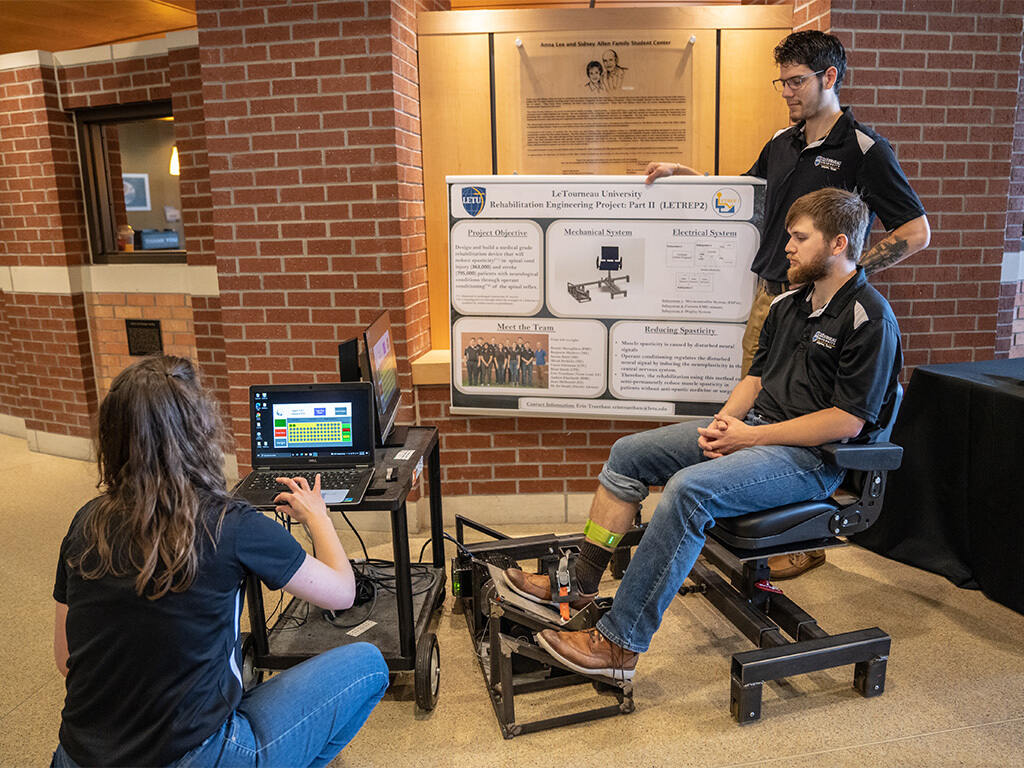
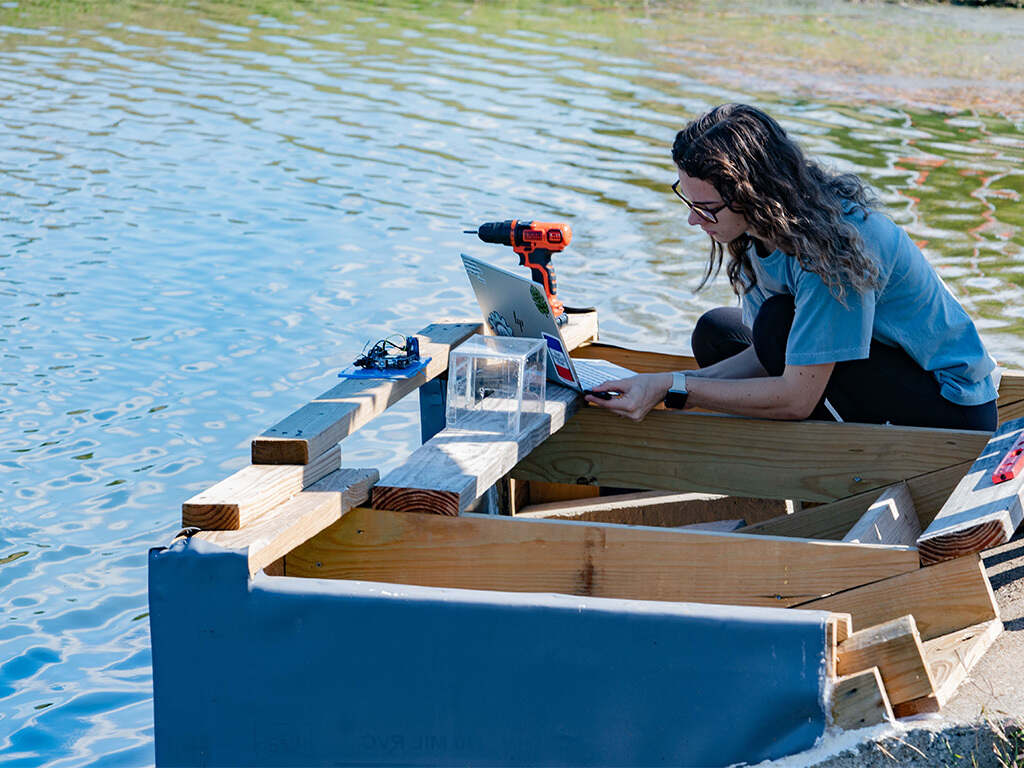
A Heart of Purpose
The reason that so many pundits in this day and age are beginning to emphasize trade school and vocational type training is not simply due to a lack of faith in four-year higher-ed. With increased usage of engineering theories and practices comes the competencies, collaboration, and confidence that are so appealing to the companies looking for the next wave of new hires.
As industry seeks for qualified professionals, the generational shifts in hiring practices showcase an increased desire for quality of work and quality of character. Character, as Tixier mentioned, which can come from working through “failure and disappointment”.
An engineer performs calculations, tests, and simulations to determine how much load a concrete pillar can sustain before it fails. In order to find the answer, they must create failure time and again, so as to create a safer structure in the long run. Similar to that concrete pillar, engineering senior design students at times experience the failures of their work as they put their theories to the test, again and again.
They do this in an environment rich with practical training but rooted in Kingdom purpose. The character of LeTourneau students is not only built in the forge of failure, but through purpose in their work and compassion for others that comes from a heart seeking to follow Christ.
Kristen Rose (‘22, Frontier Wheelchairs) states, “I have always been drawn to humanitarian work, and I feel it reflects the heart of Christ. One year, I was able to work on a team that built a surgical table for humanitarian organizations, and this year I worked with my team to design and provide powered, portable wheelchairs that are far more usable than many of those which are traditionally donated.”
Just as a nail without a hammer seems incongruous, an engineer without a baseline for principles and purpose is, practically speaking, somewhat incomplete. Employers can teach technical skills—even if they would rather not have to. What industry is not always equipped to teach is the ‘what’ in what gets a committed, trustworthy, empathic, technically excellent employee out of the bed in the morning.
The skills, in and of themselves, are still appealing, but what has piqued the interest of countless employers through the years as they continue to return for more LETU grads is seen in how they talk about our students. The industry sees the impact that these engineers make, sometimes even before they graduate.
Michael Moss is the owner of Sweet Shop USA, a chocolate company in Mt. Pleasant, Texas. One of this year’s senior design team projects was commissioned by him because of the reputation of LeTourneau engineering students. He commented, “It has been an absolute joy getting to work with these students. I contacted LeTourneau Engineering to help me with a problem in our processes, and I witnessed this undergraduate student team figure out a solution to something that multiple engineering firms that we had contacted couldn’t figure out how to do. If I could summarize the LeTourneau senior design experience from my perspective, it’s a unique blending of character-driven knowledge and industry-ready experience.”
What a powerful combination. A recipe for hope amid chaos. And what a meaningful encouragement to these graduates who are entering the workforce already making an impact, poised for a future which may require every ounce of their commitment to purpose.
A World of Opportunity
The commitment of our students is not simply to a ‘practical life,’ or even a ‘purposeful life,’ but a commitment to the purpose of a vocational calling. This calling aspires to raise the bar within engineering, within higher education; within industries, within societies. A life filled with this type of aspirational pursuit is one with a full heart. If engineering seeks to pursue solutions to the world’s problems purely for practicality or ‘ease of life’, it will miss the core truth of real peace in our world, and the heart of creation and invention will grow cold and hard.
Our founder, R.G. LeTourneau, said it this way, “We will never have real peace on earth until we give more time and loyalty to the Prince of Peace, our Lord and Savior, Jesus Christ.”
The engineering and engineering technology leaders of the future will be most impactful in our world when their hands and head work together with their heart and soul. On the surface, LETU Engineering Senior Design may appear as simply the natural culmination of a four-year undergraduate engineering degree, where theories and processes which are taught and learned can be put to the test. But dig through the hardpan of basic practicality, and there is a deeply meaningful richness: a deep desire to work for more than a career and to live for more than work.
As God tells His people in Ezekiel, “I will give you a new heart and put a new spirit in you; I will remove from you your heart of stone and give you a heart of flesh” (Ezekiel 36:26, NIV).
Visualize a world where this type of engineer is not in the minority. Can you see it? In Longview, Texas, we see it every day on our campus and, practically speaking. . . it’s downright awesome.
Everything has a purpose.
A hammer for a nail.
Senior design projects for solutions to complex problems.
And graduates of The Christian Polytechnic University for a world and a future where practicality, innovation, even groundbreaking invention, will need the character and competence that flows from a poised professionalism rooted in Christ.
Senior Design at LETU
Engineering Senior Design Projects and the elite lab experiences that accompany them.